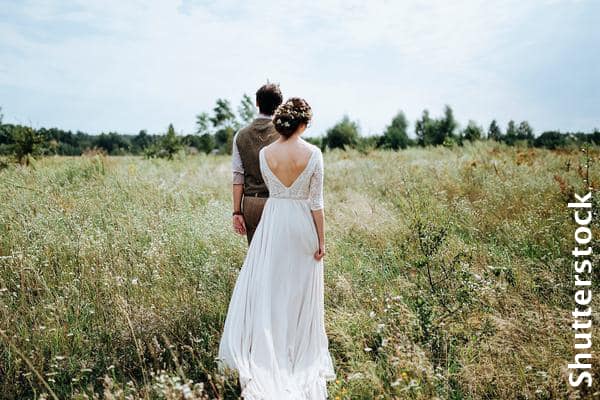
In ancient Jewish wedding custom, at least a year passed between betrothal and marriage, and during this time the bride got ready in her own home for the climactic day when the bridegroom would arrive to claim her.
In the same way the gospel age – the interval between the first coming of Christ, to win salvation for his people, and his Second Coming, to claim the ransomed church – is the period when the church on earth prepares for Jesus’ return with eager anticipation.
This interval is for the believer a time of physical separation from the Saviour. In the Song of Songs the loved one says to Christ: ‘Make haste, my beloved, and be thou like to a roe or to a young hart upon the mountains of spices’ (8:14). But it is also the period during which the elect – those chosen by God from all eternity to accept his invitation to the marriage (Matthew 22:14) – are called by the gospel, and made part of Christ’s bride.
Just as the bride is set apart for the bridegroom alone, so believers are engraved upon the palms of Christ’s hands. A golden band girds his chest (Revelation 1:13), as he bears them upon his heart and pours out his effectual prayers for them.
The bride
As the wedding day drew near, the bride would prepare herself so that on the wedding night she would be adorned in her wedding garments and waiting at home for the bridegroom to claim her. It would be a costly affair for her family, since, apart from anything else, her hair would be braided and interwoven with jewels. She would be gloriously dressed and perfumed, and wear a crown upon her head (Psalm 45; Ezekiel 16:11-12; Revelation 21:2).
In the same way Christ makes his church holy and cleanses her by ‘the washing of water by the word’ (Ephesians 5:26). She glories in Christ’s righteousness and arrays herself in the fine linen provided: the imputed righteousness of Christ. She reflects her God-given covering by her own righteous acts and character (Revelation 7:13). Her deeds, imperfect in themselves, are washed by Christ’s blood. She is ‘a glorious church, not having spot, or wrinkle, or any such thing’ (Ephesians 5:27).
The inward preparation of believers is the work of God the Holy Spirit. He created the response of faith to Christ, in whom we are justified. He sanctifies the believer. He works within us so that we both will and do God’s good pleasure. And we work out our own salvation with fear and trembling (Philippians 2:12-13), in the sure knowledge that we are preparing for the eagerly anticipated arrival of Jesus, the heavenly lover of our souls.

The bridegroom
On the great wedding night, the Jewish groom would come from his home to the bride’s family home to claim her for himself. He would be arrayed as royally as he could afford, like one who ‘decketh himself with ornaments’ (Isaiah 61:10). He would arrive accompanied by his friends in special procession, singing and carrying lighted torches.
The exact hour of his arrival would not be disclosed in advance, but it would be expected at around midnight. A special watch would be kept, ready for the first glimpse of the lights of the bridegroom’s party as it wended its way towards them. While the bride’s attendants may conceivably doze off during the long wait, it would be unheard of for them to be asleep at the actual moment the bridegroom arrived.
In our Lord’s parable of the ten virgins it was not so much the ten virgins falling asleep as the unpreparedness of the five for the ensuing events that was reprehensible. Their lamps did not have sufficient oil to continue burning for the return journey of the bridegroom with his bride to his house or the house of his parents (John 14:2-3). So believers must be prepared in their hearts for all that is implied in Christ’s return.
There was no religious ceremony in Jewish weddings. The wedding culminated at the moment when the bridegroom, brought in by his best man (‘the friend of the bridegroom’) to where the bride was waiting, removed the veil from the bride’s face (Revelation 22:4).
He threw this veil over his shoulder, signifying that from that moment he personally assumed the care and government of her life. Isaiah was surely thinking of this when he said that ‘the government shall be upon [Messiah’s] shoulder’ (Isaiah 9:6).
The marriage supper

When the groom had brought the bride home, there followed a time of feasting that might continue an entire week. This was the marriage supper, and during this time the consummation of the marriage took place.
In the same way, Jesus will come at his Second Advent, accompanied by all the holy angels (Matthew 25:31), to receive his bride for ever and convey her safely to heaven. She will then have his left hand under her head and his right hand embracing her for ever (Song 2:6). ‘Eat, O friends; drink, yea, drink abundantly, O beloved’ (Song 5:1) gloriously describes her blissful spiritual union with Christ.
The end of history will be its climax. The glorified saints, who have been reigning together with Christ during the gospel age (Revelation 20:4; Revelation 2:26-27), will be joined by the church raptured. From this time the whole church will reign together with Christ in heaven. All the kingdoms of the earth will have become the kingdoms of our God and of his Christ.
Thrilling prospect
Don’t the hearts of believers on earth and in heaven thrill at this prospect? The coming of the heavenly bridegroom is what they long for. How we look forward to Christ’s appearance on the clouds! Samuel Rutherford was ‘hungry in waiting for the marriage supper of the lamb’.
Don’t make the mistake of thinking that the day can only be anticipated if it is expected in the immediate future! However distant it is, we can still see it by faith as though already upon us. So we pray and strive in the Spirit for individual purity, in order to promote the collective purity of the church.
The expectation of that day has another effect upon us. Knowing that Christ loves his church supremely, we must be like David Dickson. Samuel Rutherford described him as one that ‘both prayeth and doeth for our dying kirk’. We must pray that peace be within her walls and prosperity her portion.
Let us hear the thrilling voice of the bridegroom saying, ‘Surely I come quickly’. ‘Even so, come, Lord Jesus’ (Revelation 22:20).








